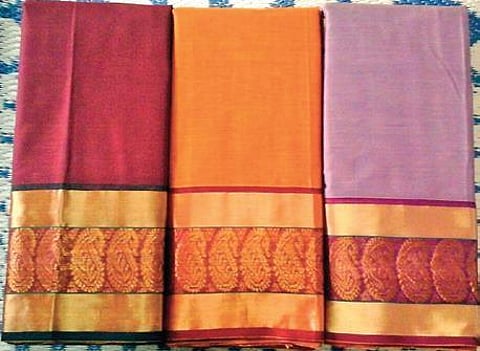

GADAG: The Ilkal sari is no longer synonymous with the rural belts of North Karnataka, where it is worn both at weddings and in the fields. The sari, symbolic of the region, is now in a more stylish league, a must-have in every wardrobe, and features in Facebook videos and websites. It is in great demand across Karnataka, and is sold at malls in South Indian metros too.
It was not so just a few months ago. Weavers of this handloom sari and other traditional varieties were in despair after the Covid-19 lockdown last year, especially with the wedding and festival season turning a damp squib. It is a wedding tradition in North Karnataka to gift cotton and silk saris to all relatives, and it is almost mandatory for families to buy hundreds of saris. Parents of the bride and groom give a gift hamper of a sari, haldi and kumkum, and family members are expected to wear these saris for the marriage rituals. But last year, marriages were cancelled or were simple low-budget affairs, and handloom units lost business.
With markets closed, orders dried up and stocks piled up, and the distressed weavers decided to find a way to reach out to customers. Some decided to go online, presuming that the pandemic may not vanish in the near future. Others started their own websites, and yet others turned to social media platforms, hardselling their products with videos on Facebook and YouTube. Weavers who do not have websites, have joined hands with online stores and microblogging sites to get orders. The uploaded videos and content on these sites also put their names on the organic Google rankings page, which will fetch them customers.
It seems their ventures have yielded results, and they are earning handsome returns. They are expecting good orders to roll in once the festival season starts. Pramod Raibagi, a weaver, said, “We were upset after all the marriage orders were cancelled. Then we got a query through a Facebook message. This led us to think of online sales, so we could reach other states too. Now we are getting orders from all parts of Karnataka. We have also tried to contact some websites, but need to work on this after the Covid wave subsides.”
Not all are going online. Some are still struggling, like a couple from Betageri who have no idea about online sales, especially after their son went to Pune in search of a good job. They say they prefer to sell offline.
Weavers like Suresh Bannadabhavi and Ashok Vannal say that online sales promise growth. “We launched our website and got connected with weaving societies from other States who helped us get orders. Some agents from Tamil Nadu, Andhra Pradesh and Maharashtra also give orders. It may be a slow process but it’s working, and sales are increasing. We are now working on brand development to reach international customers.”
Said Vannal, “It was a crisis but we could start sales online during the lockdown. It will take some time for small and mid-level weavers to get orders as many of them are from rural areas and not used to microblogging sites and online page rankings. They are now using social media platforms.”
COLOURS APART
Solid colours and unique designs set the Ilkal sari apart, which is now commanding a better price. Cotton saris cost Rs 800 upwards, while pure silk variety can go up to Rs 10,000
Betageri (Gadag), Ilkal, Gajendragad, Banahatti, Shigli, Koppal and Guledagudda have hundreds of weavers, besides smaller numbers in hamlets in Vijayapura and Belagavi
WAITING FOR TEXTILE PARK
North Karnataka weavers have been demanding a textile park for many decades, and their dreams are likely to come true with CM B S Yediyurappa announcing in his last budget that a textile park will come up at Guledagudda in Bagalkot district
SPECIAL SERAGU
Saris are unique as they are woven by joining the warp and pallu warp with a series of loops colloquially known as ‘tope teni’. Kondi technique is used for weft by inserting three shuttles
Famous for seragu (pallu), which is usually red with patterns of white temple towers. Ends of the pallu contain comb, fort ramparts, jowar and mountain range patterns
The topi teni seragu has three solid portions, one red and other colours, preferably white; borders are always maroon or red
Wearing silk or cotton sari with topi tenu seragu is a status symbol during marriages and festivals, and the wearer is given much respect
GI TAG
Ilkal is famous as the weave dates back to 8th century AD and has a Geographical Indication (GI) tag
Ilkal saris have found place in the lyrics of some Kannada songs and dialogues too. Ravichandran starrer ‘Hallimestru’ and BC Patil’s ‘Kaurava’ have separate songs which start with the line, ‘Ilkal seere utkondu...’